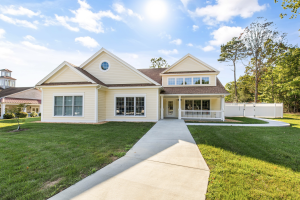 Did you know that June is Alzheimer’s and Brain Awareness Month? Alzheimer’s disease (frequently abbreviated as simply “Alzheimer’s”) and related brain disorders have become increasingly prevalent in our aging society. These conditions can significantly impact individuals and their families, making it crucial to raise awareness about their causes, symptoms, and available treatments.
Did you know that June is Alzheimer’s and Brain Awareness Month? Alzheimer’s disease (frequently abbreviated as simply “Alzheimer’s”) and related brain disorders have become increasingly prevalent in our aging society. These conditions can significantly impact individuals and their families, making it crucial to raise awareness about their causes, symptoms, and available treatments.
Here’s what everyone should know about Alzheimer’s disease and dementia, the importance of early detection, ongoing research and treatments, and practical tips for maintaining a healthy brain.
What Is Alzheimer’s?
Alzheimer’s disease is a progressive neurodegenerative disorder that affects the brain, causing memory loss, cognitive decline, and behavioral changes. It is the most common form of dementia, accounting for approximately 60-80% of all dementia cases. The disease is thought to be caused by the accumulation of beta-amyloid plaques and tau protein tangles in the brain, leading to the destruction of nerve cells and disruption of communication between them.
Alzheimer’s Disease vs. Dementia
Dementia is an umbrella term that encompasses a range of cognitive impairments, including Alzheimer’s disease. While Alzheimer’s is a specific form of dementia, other types exist, including:
- Vascular dementia
- Lewy body dementia
- Frontotemporal dementia
Each type of dementia presents with unique symptoms and may have different underlying causes. It is essential to receive an accurate diagnosis to determine the most appropriate treatment and care plan.
The Importance of Early Detection
Early detection of Alzheimer’s disease and other forms of dementia is critical for several reasons. First, it allows individuals and their families to seek appropriate medical care, support, and resources to manage the condition effectively. Second, it enables individuals to participate in clinical trials and research studies aimed at advancing our understanding of these disorders and developing potential treatments.
Symptoms of Alzheimer’s Disease
Here are 10 common Alzheimer’s symptoms everyone should be aware of:
- Memory loss that disrupts daily life
- Challenges in planning or problem-solving
- Difficulty completing familiar tasks
- Confusion about time or place
- Trouble understanding visual images and spatial relationships
- New problems with words in speaking or writing
- Misplacing things and losing the ability to retrace steps
- Decreased or poor judgment
- Withdrawal from work or social activities
- Changes in mood and personality
Research and New Treatments
Researchers worldwide are actively investigating Alzheimer’s disease and related brain disorders. Significant progress has been made in understanding the underlying mechanisms and developing potential treatments. Some areas of research include exploring the role of genetics, investigating lifestyle factors, and studying potential therapeutic targets, such as reducing beta-amyloid plaques and tau protein tangles in the brain. Clinical trials are underway for various experimental drugs and therapies, providing hope for future treatments.
Tips for Keeping Your Brain Healthy
 While there is currently no known cure for Alzheimer’s disease, certain lifestyle choices can help promote brain health and potentially reduce the risk of developing dementia. Consider implementing the following tips:
While there is currently no known cure for Alzheimer’s disease, certain lifestyle choices can help promote brain health and potentially reduce the risk of developing dementia. Consider implementing the following tips:
- Get regular physical exercise. In addition to keeping you physically fit and mobile, working out improves blood flow to the brain and promotes neuroplasticity.
- Adopt a balanced and nutritious diet, including foods rich in omega-3 fatty acids, antioxidants, and vitamins.
- Maintain a socially active lifestyle to stimulate cognitive function and emotional well-being. Try engaging in hobbies, pursuing education, participating in community groups, and maintaining strong social connections.
- Challenge your brain with mentally stimulating activities like puzzles, reading, learning new skills, or playing musical instruments.
- Prioritize getting high-quality sleep, since this allows the brain to consolidate memories and recharge.
- Be vigilant about managing chronic health conditions, such as diabetes, high blood pressure, and obesity. All of these are linked to an increased risk of cognitive decline.
- Manage stress levels through relaxation techniques, such as meditation, deep breathing exercises, or engaging in activities that bring you joy and relaxation.
- Protect your head from traumatic injuries by wearing appropriate safety equipment during sports and activities.
- Avoid smoking and excessive alcohol consumption, which have been linked to an increased risk of cognitive decline.
If you or a loved one is experiencing memory loss or other cognitive changes, it’s important to consult with a healthcare professional for an accurate diagnosis and appropriate care. You can enjoy a healthy brain and the care you need for any cognitive concerns by choosing a retirement community that supports brain health and offers memory care for seniors.
Enjoy Good Brain Health With Rappahannock Westminster-Canterbury
 Rappahannock Westminster-Canterbury is a continuing care community (also known as a life plan community) providing the highest quality living experience for discerning senior adults. Situated on 165 beautiful acres outside the village of Irvington in Virginia’s Northern Neck, RWC residents choose to live here for the independent and worry-free lifestyle afforded in a tranquil setting. In addition to supporting a brain-healthy lifestyle, RWC also offers excellent memory care services including our latest in continuum of care offerings – The Small House – a residential home for residents who are experiencing mild to moderate cognitive impairment or memory challenges.
Rappahannock Westminster-Canterbury is a continuing care community (also known as a life plan community) providing the highest quality living experience for discerning senior adults. Situated on 165 beautiful acres outside the village of Irvington in Virginia’s Northern Neck, RWC residents choose to live here for the independent and worry-free lifestyle afforded in a tranquil setting. In addition to supporting a brain-healthy lifestyle, RWC also offers excellent memory care services including our latest in continuum of care offerings – The Small House – a residential home for residents who are experiencing mild to moderate cognitive impairment or memory challenges.
At RWC, you’re only a ten-minute drive from the Chesapeake Bay or the Rappahannock River as well as a variety of creeks, estuaries, and other rivers. You’ll have access to all that our local freshwater and saltwater destinations have to offer, from outdoor recreation to dining on fresh local catches to boutique shopping. Rappahannock Westminster-Canterbury Inc. is a Virginia nonprofit corporation affiliated with the Episcopal and Presbyterian churches. All religions are welcome. Read about our residence options and living our lifestyle!
